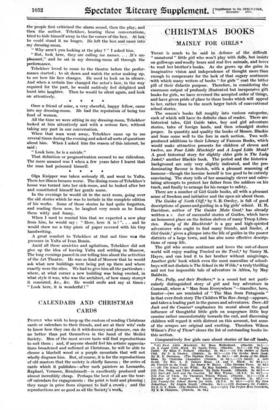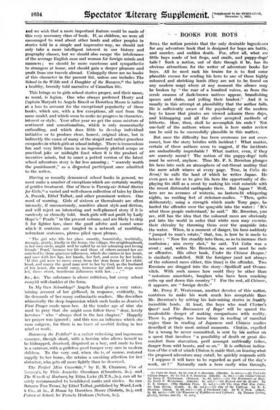- CHRISTMAS BOOKS
'ILIAINLY FOR GIRLS *
THERE is much to be said in _defence of the difficult " unnatural " little girl who won't play with dolls, but insists on golliwogs and woolly bears and real live animals, and loves to read her brother's books. As she grows up she gains in imaginative vision and independence of thought more than enough to compensate for the lack of that sugary sentiment 'with which many writers of books ", for girls ". coat the bitter pill of their didactic purpose. Therefore, in considering the enormous output of profusely illustrated but inexpensive gift books for girls, we have reversed the accepted order of things, and have given pride of place to those books which will appeal to her, rather than to the much larger batch of conventional school stories.
The season's books fall roughly into various categories, each of which will have its definite class of reader. There are historical tales, Girl Guide tales, boy and girl adventure stories, tales of foreign lands, and then schoolgirl stories proper. In quantity and quality the books of Messrs. Blackie and Sons come well to the fore in each section. Two well- produced additions to their Library of Famous Books, which would make attractive presents for children of eleven and twelve, are Four Little Mischiefs' and A Loyal Link Maui s' A good historical story for slightly older girls is The Lady Isobel,* another Blackie book. The period and the historica background are only very slightly indicated, and the pre- dominating flavour is Scotch, with a pleasant seasoning of humour—though the heroine herself is too good to be entirely convincing. The story tells of her amazingly clever and calcu- lating attempts to protect her father from the soldiers on his track, and finally to arrange for his escape to safety.
There are a number of Girl Guide books, all with a pleasant sense of freedom and initiative and the open air about them.
The Guides of North Chff,4 by S. B. Owsley, is full of good descriptions of games and guiding in a big girls' schoOl. H. B. Davidson, author of The Guides Make Good,* has already written a n -ther of successful stories of Guides, which have an honoured place on the fiction shelves of many Troop Libra- ries. Bunty of the Blackbirds' is a gay and high-spirited adventurer who ought to find many friends, and Smiler, A Girl Guide,7 gives a glimpse into the life of guides in the poorer districts of a large town, and has also some effective descrip- tions of camp life.
The girl who scorns sentiment and loves the out-of-doors world will enjoy reading Tracked on the Trail,' by Nancy M. Hayes, and can lend it to her brother without misgivings. Another girls' book which even the most masculine of school- boys will not disdain is The School in the Wilds,* a truly thrilling and not too impossible tale of adventure in Africa, by May Baldwin.
Pen, Polly, and their Brothers," is a sound but not parti- cularly distinguished story of girl and boy adventure in Cornwall, where a " Man from Everywhere "—traveller, hero, hunter—(we are reminded of " The Man from Patagonia " in that ever-fresh story The Children Who Ran Away)—appears, and takes a leading part in the games and adventures. Dare-All Jack and the Cousins" emphasizes its moral about the good influence of thoughtful little girls on scapegrace little boy cousins rather uncomfortably towards the end, and discerning children will regard it with distrust on this account, but some of the scrapes are original and exciting. Theodora Wilson Wilson's Five of Them'* closes the list of outstanding books in- this section.
Comparatively few girls care about stories of far-off lands,
• (1) Pour Little Mischiefi. By Boss Mulholland. (Blackie. 2s.)— (2) A. Loyal Little Maid. By Sarah-Tyler.. (Mackie. 2s.)—(3) The Lady Isobel. By Eliza F. Pollard. (Mackie. ft-. 6d.)—(4) The Guides of North UV. By 8. B.-Owsley. (Blackie. 3s. 8d.)—(5) The Guides Make Good. By H. B. Davidson. (The Sheldon Press, at. 6c/J—(6) Runty of -the Blaek- bi7dr. By Christine Chandler. (llishets. 3s. 6d.)—(7) Smiler, .A Girt Guide. ' BY Mrs. A. E. Osborn Hann. (A. and C. Black: 2s. 6d.)— (8) Tracked on the Trail. By /fancy M. Hayes. (The Sheldon Press- 2s. ed.) The School in the Wilds. By May Baldwin. (Chambers. 3s. ed.)- (10) Pea, Jack and- Their Brothers. /is Doris Pocock.. (Blackie. 6d.)-- (11) Dare-AU ack and the Cousins. By May Wynne. (R.T.8. 2s. eth) (12) Five of Them. By Theodora Wilson Wilson. (Blackie. 2s.)—(13) A Daughter of the 'Rangers. By Bessie Merchant. (Blaekle`. 2s. 6d.)- (14). Twenty-Six School Stories for Girls. (1.T.S. 3s. 6d.)—(15) My Own Schooldays.' By Angela -Brazil:- (Blackie. 6s.)—(16) Rosemary the Peddler, Ey7. 0. F.-Nash. (The Sheldon Press. 2s.)—(17) The Perfect Mies Corerdale,, MY B. H. Chinn- on. (Msbets. 3a. ed.) and we wish that a more important feature could be made of - this very necessary class of book. If, as children, we were all encouraged to read about other lands and other peoplei in stories told in a simple and impressive way, we should not only take a more intelligent interest in our history and geography- classes, but we should also escape the intolerance of the average English man and woman for foreign minds and manners ; we should be more courteous and sympathetic to strangers at home, and should gain a deeper pleasure and profit from'oUr travels abroad. Unhappily there are no books of this character-in the present-list, unless one includes The School in the Wilds and A Daughter of the Rangers," the latter a healthy, breezily told narrative of Canadian life.
This brings us to girls school stories proper, and their name, RS usual, is legion. One who always preferred Bents and Captain Maryatt to Angela Brazil or Dorothea Moore is rather at a loss to account for the exceptional popularity of these books, which are, with a few exceptions, all cast from the same model, and which, seem to make no progress in character, interest or style._ Year after year we get -the same mixture of sentiment and sensationalism, which is only momentarily enthralling, and which does little to develop individual initiative or to produce clear, honest, original ideas, but is indirectly the cause of many of the stupid and rather graceless escapades in which girls at school indulge. There is tremendous fun and very little harm in an ingeniously plotted scrape or practical joke or midnight feast when it is the product of inventive minds, but to enact a potted version of the latest school adventure story is far less amusing ; " scarcely worth the punishment," as a disgusted participant once admitted to the writer.
Having so roundly denounced school books in general, we must make a number of exceptions Which are certainly worthy of gentler treatment. One of these is Twenty-six School Stories for Girls," a varied and well-chosen collection of tales by Doris A. Poccick, Ethel Talbot, and other prominent writers. One word of warning. Girls of sixteen or thereabouts are often intensely, if unconsciously, sensitive about style and- diction, and will reject an interesting and well-planned story if it is carelessly or clumsily told. Such girls will not profit by Lady Hope's " Pearls " in the present volume, and are likely to skip it for lighter fare; since the good advice and sound sense which 'it contains are tangled in a network of rambling, redundant sentences, phrase piled upon phrase..
" The girl who fills her place sweetly, beautifully, truthfully, strongly, gently, kindly in the home, the village, the neighbourhood, In her own circle, might well be called by us her admiring and loving friends Pearl,' because her life and those of others around her are enriched by those gracious influences, which she chrries in her heart, and uses with her lips, her hands, her feet, and even by her looks. ' If this girl were to move away from the dear home of her child- hood, and marry the good man sent to her by God, as ihe husband of her heart, she would carry, however far afield her steps were led, those sweet, beneficent_ influences with her. . . "
&c., &c. The substance is above criticism, but every school essayigt will shudder at the form. _
In My Own Schooldays" Angela Brazil gives a very enter- taining account of her girlhood, in response, evidently, to the demands of- her many enthusiastic readers. She describes whimsically the deep impression which such books as Jessica's . First Prayer made upon her. At the tender age of nine she _ used to pray that she might soon follow these " dear, lovely heroines ". who " always died in the last chapter." • Happily . her prayer was ignored; and this was an influence which she =, soon outgrew, for there is no trace of morbid feeling in her mind or work.
Rosemary the peddler" is a rather refreshing and, ingenuous romance, though short,. with a heroine who allows herself to be kidnapped, deceived, disguised as a boy, and made to live In a caravan, with a guileless good temper very rare in modern children. To the- very end, when she is, of course, restored happily to her home; she retains a sneaking affection for her '..' tbductor,, who gets off more lightly than he deserved.
The Perfect Miss Coverdrile," by E.. M. Channon, Pen al - Grego' by Elsie, Jeanette OXenham (Chambers, 5s.), and
The Wraith of Raeburne by, Edna Lake 5s.), can all be reebnithended to. bewildered aunts and uncles. So can _ Between Two TeimsciiiEthei fialbot, publiShed by Ward, Lock Sr. Co., at 5s., Z House by Dorothea Moore (Nisbets, 5s.), and Patseu at School, by Pamela IIinkson (Nelson, 5s.).



































































 Previous page
Previous page